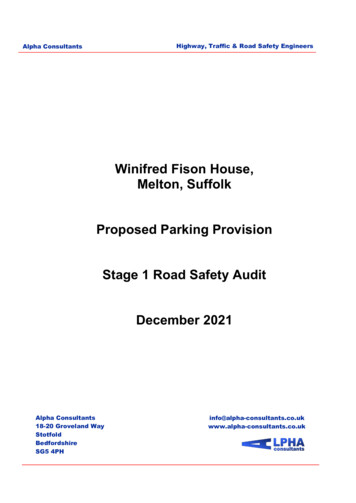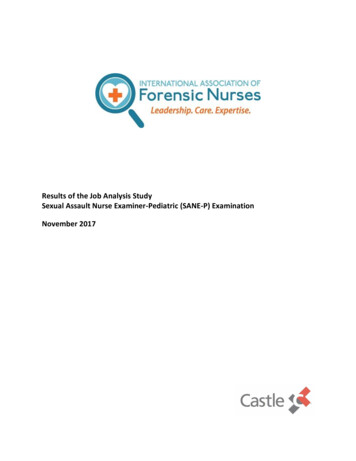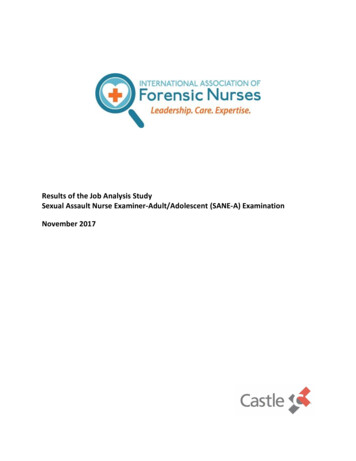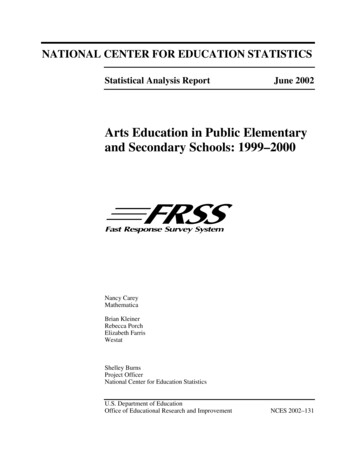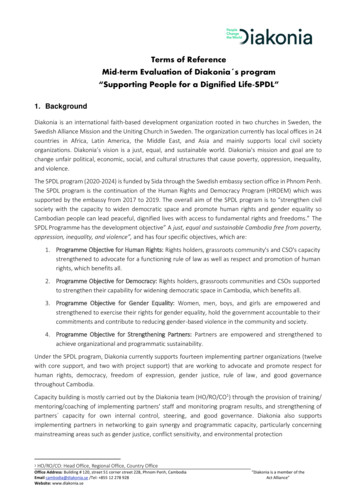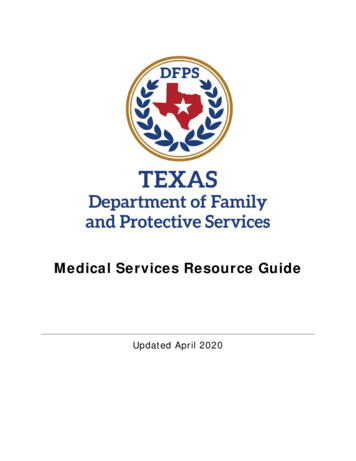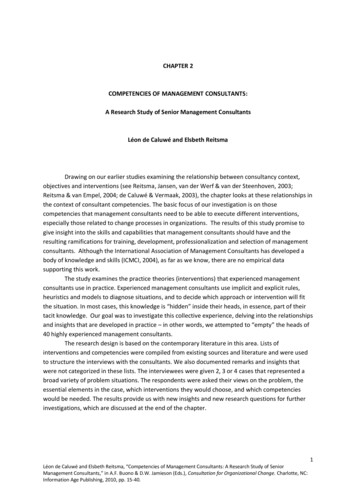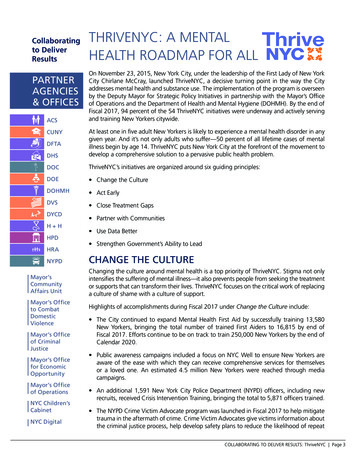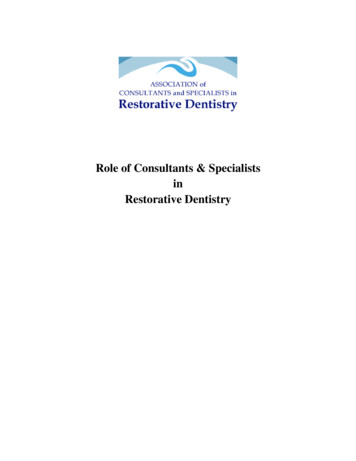
Transcription
Role of Consultants & SpecialistsinRestorative Dentistry
Index1.Executive summary . 32.Restorative Dentistry .52.1: Definition2.2: Aims2.3: Remit3.Consultants and Specialists 63.1: Consultants3.2: Specialists4.Training & competency .84.1: Specialists in practice4.2: Consultants in Restorative Dentistry5.Role of the Consultant. .105.1: Patient Care5.2: Education5.3: Research5.4: Support & Advice to Primary Care Trusts5.5: Management5.6: Quality Assurance5.7: Working with Other Professionals5.8: Political5.9: Others6.Workload .146.1: Average Working Week6.2: Workload – New Patients6.3: Workload - Treatment7.Casemix 167.1: Referral Pathway8.Workforce 188.1: Current8.2: Estimates8.3: Future supply9.Bibliography . .2010. Appendices .21Appendix 1: Categories of Patients normally accepted for Treatment with the Restorative ServiceAppendix 2: Referral Pathway2
1.0 Executive summaryRestorative Dentistry evolved as a recognized dental specialty in 1973 and comprises a broadbased area of expertise on the restoration of teeth and oral tissues. Over the past 35 years thespecialty has seen significant changes as a result of changing population demographics includingincreasing life expectancy and greater patient awareness and maintenance of oral and dentalhealth with a desire to retain natural teeth for longer. The next five years will see significantchanges within health care and restorative dentistry needs to adapt to these changingcircumstances. All consultants in Restorative Dentistry, as in other specialties, see patientsreferred for specialist/secondary care either within Dental Hospitals or District General Hospitalsand as such are an important component of the support needed for NHS Dentistry.Patient‟s expectations and the high cost of restorative treatment needs, often of amultidisciplinary nature, have made the Consultant‟s role today more demanding andchallenging. The National Health Service, since its inception in 1946, has gone through a numberof initiatives aimed at improving access to dental care with the biggest change being theintroduction of financial scrutiny. These changes have improved the quality of patient carebalanced with financial accountability and awareness. Unfortunately despite being established asa recognized specialty the breadth and scope of Restorative Dentistry remains poorly understoodby many leaders and managers within the Health Services of the United Kingdom, often equatingthe discipline to being the same as “high street” dentistry. To this end the role of the consultantin Restorative Dentistry remains poorly understood and appreciated.Restorative Consultants are employed either within the NHS or by Universities, the latter beingemployed with an honorary status. The bulk of consultants are employed directly or indirectly byDental Hospitals and Schools, however, over the past 10 years there has been a growth inConsultants being appointed to District General Hospitals. All Restorative consultants seepatients needing secondary or specialist levels of care but have an ever increasing focus onmultidisciplinary treatment with different medical or dental teams. The key role of theconsultant has been to provide support and advice predominantly for patients referred by Dentistswithin primary care and other secondary providers and where appropriate patient treatment. Allconsultants have a commitment to education, research and training with Honorary consultantscommitted to education and training of undergraduate and postgraduate dental students thus3
helping maintain the workforce in dentistry. Honorary consultants are actively involved withresearch, normally patient centred, and achieve a high impact on restorative dental research.The on-going changes within the health services are likely to see a shift of oral health care,potentially including restorative dentistry, into the primary care setting thus taking services closerto the patient. The Consultant in Restorative Dentistry will assume an ever increasing importanceif changes are to be accommodated effectively while maintaining a high standard of patient care.Restorative Consultants can act as primary advocates to continue effective dialogue between thecommissioners and purchasers and dental practitioners.The purpose of this document is to provide an update and overview on the changing andexpanding Role of the Consultant in Restorative Dentistry and Specialists in the Health Servicetoday. It also provides guidelines on the function of and workload within the specialty.4
2. Restorative Dentistry2.1: DefinitionRestorative Dentistry includes clinical practice, teaching and research into comprehensive andtherapeutic oral health care for patients of all age groups including those who demonstratemedical, physical, intellectual, psychological and/or emotional problems. It involves therestoration and rehabilitation of the oral and dental tissues lost as a result of disease, inheritanceand trauma to meet the aesthetic, psychological and functional needs of the patient, oftenrequiring the co-ordination of multi-professional teams within and outwith dentistry.2.2: AimsThe specialty of Restorative Dentistry aims to:-Deliver advice, support and treatment to patients referred from primary care-Improve the oral health of patients of all age groups through appropriate preventive,educational and treatment services.-Deliver high quality patient centred research-Ensure that individuals and agencies, both government and private, are given the relevantinformation in order to include the provision of specialist restorative care in theirdecision making processes to meet the oral health needs of the local population.2.3: RemitRestorative Dentistry forms one of the 13 different dental specialties. It evolved as a distinctspecialty in 1973 and comprises the following and particularly their integration:-Periodontology which is the prevention, diagnosis and management of disorders of thetissues supporting the teeth (gums) and their associated structures;-Endodontics which is the diagnosis and management of disorders of the tooth pulp andthe tissues surrounding the root of a tooth-Prosthodontics which is the diagnosis and management of the replacement by removableand fixed prostheses (including implants) of teeth and associated structures lost as aresult of disease, inheritance or trauma. This also includes operative dentistry whichinvolves the restoration of teeth damaged by caries or tooth wear;5
3.0.Consultants and Specialists in Restorative DentistryIn recent years the importance of Restorative Dentistry has been recognized by an increase in thedemand for consultant-led restorative services. Whilst the concept of specialism in Dentistry hasbeen recognised by many (Mouatt Report 1994), Restorative Dentistry remains one of the morepoorly recognized Consultant-led hospital–based dental specialties despite it being one of themost cost effective ways of delivering specialist treatment to targeted patient groups.3.1: ConsultantsA consultant today has an-all encompassing role where he/she is a leader of service delivery andpatient care allied to the educational and research demands which form the cornerstone of today‟shealthcare. They are predominantly based within the Hospital Services and interface with a widerange of providers including those based within the General Dental Services (dental practices) aswell as those within the Salaried Primary Care Dental Services. They will also contribute toundergraduate and postgraduate education. Consultants will usually lead a team and be at theforefront of rehabilitation of patients with complex and multidisciplinary treatment needsparticularly cancer care and those suffering from hypodontia and clefts. In regional and dentalhospitals consultants are integral to undergraduate and postgraduate education. They have similarresponsibilities to all other consultants including re-accreditation and professional development.All consultants will have an annual job plan agreed and are expected to undergo annual appraisalto ensure that their personal developments needs are met. The same rules apply to ClinicalAcademics with an Honorary Consultant Contract who have a larger commitment to research.Consultants may also be required to take on the role of Training Programme Director within aRegion, with a responsibility both to the Postgraduate Deanery and to the Royal Colleges. Theyare appointed by appropriately constituted and recognised appointment panels.(For further details of consultant job planning and appraisal refer to BMA ConsultantsHandbook). Further details of the role are covered later.3.2: SpecialistsSpecialists have expert knowledge and experience in the diagnosis and management of problemsrelated to that specialty. They were introduced to improve the access to specialist levelrestorative care in a primary care setting (Mouatt Report 1994). They predominantly work withinthe primary care setting in independent practice and are able to accept referrals of, and providecare for, patients with problems in the specific discipline. However with the increasing treatmentand training needs there are positions being established, mainly within University Teaching6
Hospitals and Schools, where specialists play a role in the provision of education to those trainingto become specialists and also other dental care professionals and professionals allied tomedicine. Positions are also being created for specialists within the salaried health services,either as community based specialists, specialist practitioners or as part of a hospital basedconsultant-led team to help cope with the increasing demand in each of these disciplines. Theymay also contribute to the service development within their locality.7
4.0 . Training & CompetencyLocal training programmes for those aspiring to be either Consultants or Specialists have beendetermined and fully accredited by the Regional Deaneries, based on a nationally agreedcurriculum. The Specialist Advisory Committee (SAC) and the JCPTD - Joint Committee forPostgraduate training in Dentistry - of the Royal Colleges play a key role in defining thecurriculum which is competency based. The implementation of the curriculum is quality assuredby the Regional Deaneries. Those wishing to enrol in a programme must have completed 2 yearsof General Professional Training (GPT) and successful acquisition of a training place is viacompetitive entry. Due to the lack of clinical academics, there is currently a drive to increase thenumber of academic training places via the development of academic training posts which arepart funded by the Department of Health. The posts, pre PhD or post PhD, are funded by theNHS through the NIH IAT (integrated academic trainees) and aimed to provide supplementaryfunding to Universities to improve succession planning. These posts however still need to fulfilthe training requirements for either a Specialist or Consultant. The training standards are qualityassured through formal assessment - ARCP (Annual Review of Competence Progression,previously known as the Record-In-Training Assessment – RITA) as agreed by the deanery. Allprogrammes fulfil the General Dental Council (GDC) requirements for enrolling on one of thespecialist lists. There are distinct differences between the training of a consultant compared tothat of a specialist.4.1: Training of SpecialistsSpecialists in each of the disciplines of Endodontics, Periodontology and Prosthodontics enrolinto recognised training programmes currently offered predominantly within a University setting.The majority are self funded, although there are some situations where the funding is provided bythe NHS. Acceptance onto a programme is by competitive entry. The end point of training isdemonstrated by the achievement of the „Membership in Restorative Dentistry (MRD)‟examination within the specific discipline. This, in conjunction with satisfactory progressthrough the ARCP process, will result in the award of a „Certificate of Completion of SpecialistTraining (CCST)‟ which enables entry onto the Specialist Register held by the General DentalCouncil. The current requirement for entry into this list is a minimum of 3 years of specialist leveltraining, or evidence of equivalence. Specialists may work in a number of spheres as previouslyindicated.8
4.2: Consultants in Restorative DentistryThe training for a Consultant in Restorative Dentistry takes place over 5 years and culminates inthe successful completion of the Intercollegiate Specialty Fellowship Examination (ISFE). The 5year training programme is competency based and covers a range of domains which includeknowledge, clinical, management, communication, teaching and research with an emphasis on60% of the training time to be dedicated to clinical outputs.The additional training time for a restorative consultant allows for close integration with otherspecialties and additionally focuses on management training with a particular emphasis ongovernance, quality assurance and Health Service delivery including leadership and managementskills and integrated team working.9
5.0 Role of the Consultant in Restorative DentistryThe Role of the Consultant in Restorative Dentistry is similar to that of consultants in the othermedical and dental disciplines in the National Health Service. Accordingly, they are responsiblefor managing the care of patients, assisted by a team of junior staff, trainees and other dental careprofessionals (DCPs). They integrate and liaise with other consultants within dentistry andmedicine as part of a team in the overall care of the patient. The role is multifaceted and the listprovided below gives an overview whilst not being exhaustive. Dentistry in primary care has anincreasingly mixed economy with delivery of care from the NHS and private sources producingunique pressures for the NHS. As such Restorative consultants provide valuable and independentadvice to all patients. Within primary care Dentistry there are no other comparable groups withthe necessary levels of training and expertise to provide advice and treatment to those patientsneeding secondary levels of care.5.1: Patient CareThe consultant plays a key role in the provision and delivery of service which involves advice,treatment, treatment in conjunction with the referring practitioner and second opinions.Restorative consultants provide:-Service Delivery: Acceptance of referrals for advice and management-Treatment: Usually this will be via their teams and will usually be aimed at patients needingsecondary or tertiary care.-Integrated and multidisciplinary care: For patients requiring multidisciplinary teammanagement to optimize the clinical outcome.-Interaction with other providers of care to optimize service delivery and patient care egGeneral Dental and Medical Practitioners, Dental Care Professionals, other health careproviders5.2: EducationThe consultant plays an essential role in the education and training of all dental professionals. Inparticular the consultant will play a key role in the education/training and clinical supervision ofthe following groups of hospital junior colleagues:-General Professional Trainees – consultants may be the hospital-based educational supervisorfor newly qualified colleagues undertaking a two year programme of training in primary andsecondary care; also delivering education, training and clinical supervision for them.10
-Senior house officers (SHOs) or equivalent grade as DF2: The consultant may be theeducational supervisor and takes the overall responsibility of ensuring that the trainingcurriculum fulfils the Deanery requirements and the needs of the trainee are met.-Specialist / Specialty Registrars: Consultants act as clinical or educational supervisorsworking together with the Training Programme Directors (TPD) to ensure that the trainingprogramme fulfils the training requirements as established by the Deanery and Colleges. Theconsultant will play a key role in ensuring that the trainee meets the competency basedcurriculum requirements by ensuring that appropriate appraisals and assessments areundertaken in a timely manner. A consultant may also hold the position of the TPD.As well as delivering clinical advice and support, consultants will provide education for thefollowing:-Primary care dentists in general practice and the salaried services: This is usually via thedelivery of section 63 courses and may also involve leading distance learning courses fordental practitioners-Dental care professionals (DCPs), such as dental therapists, dental hygienists and dentalnurses-Other Consultants and Specialists in Restorative Dentistry-Speciality training in Endodontics, Periodontics and Prosthodontics delivered both inuniversity dental hospitals and other hospital units. The training programmes involvemeeting the required standards of clinical, didactic and research training as specified by theDeanery.-Dental undergraduate and postgraduate students dependent on the role of the individual in adental teaching institution5.3: ResearchConsultants, both substantive and honorary work to drive forward the research agenda within theNHS and Universities. Honorary Consultants in the UK encompass some of the best knownDental Researchers in our speciality throughout the world. The key areas of interest that aconsultant will be expected to lead are:-Disease prevalence and the demand on services-Evaluating the clinical outcomes of treatment-Developing new strategies for improving and managing restorative problems-Linking basic science to the clinical environment-Patient reported outcome measures11
5.4: Support and advice to primary care dental services-Professional leadership to the PCTs and dental advisors in delivery of restorative services-Working towards developing clinical care networks to improve the effectiveness and deliveryof restorative care5.5: Management-Working with health care managers to develop efficient pathways for patient care-Working with managers and finance teams to develop and deliver cost effective strategies forthe provision and delivery of restorative care-Improve awareness and understanding of the scope of Restorative Dentistry alongside thetreatment needs of patients-Promote the awareness of Restorative Dentistry in the wider arena nationally and itsimportance in the context of quality led patient care-Managing and developing professional and DCP staff5.6: Quality Assurance-Lead on quality assurance (clinical governance) locally and nationally-Lead on Clinical Effectiveness and Audit to help drive service delivery and outcomes-Ensure that clinical guidelines established by NICE are implemented and acted upon-The consultant may also become involved in guideline development either through the RoyalColleges or National Institute of Clinical Excellence5.7: Working with other professionals-Offering advice and support to health professionals in other disciplines across dentistry andmedicine including general medical practitioners, health visitors and other healthprofessionals-Working with purchasers of clinical services eg Primary Care Trusts (and their futuresuccessors) to deliver quality assured service in their local areas5.8: Political-Development of oral health care strategies with a focus on the delivery of RestorativeDentistry at local, regional and national level-Influencing measures to improve restorative dentistry services-Acting as advocates for patients to ensure that their restorative needs are adequately met12
-Working with the leaders of health care delivery to ensure that remit of Restorative Dentistryis known at local and national levels5.9: Others-Play a role in leading revalidation for their teams-Maintain an up to date record of professional development and CPD-Provide evidence of standards of clinical practice by participating in annual appraisal and jobplanning-Lead on external peer reviews and undertake appraisals-Become members of advisory committees of the Royal Colleges-Become examiners for the Colleges or assessors for the GDC-Secure positions on committees locally and nationally13
6.0 . WorkloadThe document „Consultant Practice & Workload in the Dentally Based Specialties‟ defines theworkload for the Consultant in Restorative Dentistry.6.1: Average working weekThe average working week for a full time (FT) consultant is made up of 10 sessions. For parttime consultants the working week is agreed on a pro rata basis. The actual number of weeksdedicated to patient care are determined as follows:52 – 10 weeks 42 weeks (6 weeks annual leave; 2 weeks bank holidays; 2 weeks study leave)6.2: Workload – New Patient consultation clinicsConsultant contracts are either substantive NHS contracts or Honorary contracts usuallyassociated with Senior Clinical Academic posts. The workload of a consultant may vary and isdetermined by local agreement and agreed within the individual‟s job plan with the Clinical orMedical Director. The job plan is normally based on 10 Programmed Activities (PA) a week fora full time consultant with each programmed activity being equivalent to 4 hours‟ work. Theworkload is normally dependant on the service needs and for clinical academics is determined bythe local educational and research needs. The PAs are usually split between direct patient careand supporting activities such as audit, governance, continuing professional development andteaching.A Full time (10 sessions) NHS funded consultant would usually be expected to undertake 2 newpatient consultation sessions per week with an average of 6-8 new patients (the lower end if thisis a teaching clinic). There is normally some allowance made for DNA (did not attend)occurrences which would be agreed within a job plan.42 weeks x 2 clinics x 6 – 8 504 - 672 patients per yearFor part time NHS funded consultants, this figure is calculated on a pro-rata basis. Consultantswith 6 sessions or less may on average undertake 1-1.5 consultation clinics. The distribution ofnew to follow up clinics is normally determined locally during the consultant‟s job planningwhich should take place annually. In terms of patient volume and time per patient it should benoted that most new patients will need radiographs and associated investigations which are14
normally interpreted at the same visit so that a full diagnosis and treatment plan is given at thatappointment, unlike other disciplines where tests are requested and the final diagnosis andtreatment plan is made at a follow up visit.The nature of the Clinical Academic‟s job derives from its 2 major components – academic andclinical both of which make up the integrated workload. Full time Clinical Academics withHonorary Consultant Contracts would normally be expected to spend 50% of their time to clinicalactivity, either patient treatment or undergraduate teaching. The role and responsibility of anHonorary Consultant falls in line with substantive NHS Consultants; however, the remit for theseUniversity positions is balanced between research, education and clinical care. The distributionof the work load is determined at a local level and agreed within the job plan by the Universityand NHS organisation, however it is suggested that within the 50% of the clinical time, time isallowed for patient care. The direct clinical care duties for Clinical Academics would include(but are not limited to) a dental teaching clinic where patients are treated under the directsupervision of the Clinical Academic, personal treatment sessions and an outpatient clinic (egnew patient clinic) where patients are seen with trainees in attendance. The contractualobligation of Honorary Consultants falls in line with the NHS guidance (further details can befound in the BMA consultant Handbook).6.3: Workload – Treatment ClinicsThe number of patients seen will be determined by the complexity of the case seen. However onaverage for routine recall and follow ups an estimated number of patients can range from 4-6depending on the case mix.15
7.0 CasemixThe Consultant in Restorative Dentistry normally works on a shared care basis with the referringdental practitioners who have the responsibility for the patient‟s continuing care which includesmaintenance. The service aims to provide: Multidisciplinary care for patients liaising with other disciplines within dentistry egorthodontics, oral surgery An advisory, diagnostic and treatment planning service to support medical and dentalpractitioners. Patient treatment in conjunction with the referring dental practitioner, providing if necessaryguidance in the planning and execution of treatment as necessary Recall clinics where treatment outcomes for patients are evaluatedThe needs of referred patients that are accepted for treatment within the hospital based restorativeservices will usually depend on the local NHS priorities. The acceptance criteria will normally bediscussed and agreed with the local Primary Care Trust who commission the service from theTrust and pay for the delivery of the service. Most Primary Care Trusts have a Dental Advisorwho represents the local dentists and has an important role in the discussion and agreement aboutthe acceptance criteria. A number of Units particularly Dental Hospitals will also includeadditional factors in their acceptance criteria particularly for their Educational and Researchneeds. However it is important that patients and their experience of care continues to remain atthe core of any educational and research objectives in line with the National Health Service oftoday. The focus of modern day commissioning is based on Quality with the patient at the coreof the service delivery, education and research.The patient who is accepted for treatment is normally discharged back to the care of the referringpractitioner on completion of the active course of treatment, thus ensuring that the dentalpractitioner maintains the overall and ongoing responsibility for the patient‟s dental needs. Thelist in appendix 1 gives a guide to the types of patients normally accepted for treatment.Treatment within a hospital department is often undertaken by the Consultant or their team withthe Consultant retaining the overall responsibility of the patient.16
7.1: Referral PathwayThe referral pathway for patients (also called the patient journey, patient pathway or carepathway) is developed locally in conjunction with the Primary Care Trusts to meet the demandson the service in line with the national targets. Appendix 2 shows an example of such a pathway.Each Trust will have their local guidelines for the time frames within which patients referred tothe service are seen for consultation with many focussing on keeping this within 9 weeks ofreceiving the referral.Referral letters are usually triaged by the Consultant in Restorative Dentistry who will determinethe urgency from the information provided in the letter. A number of hospitals have designedreferral proformas making the referral process much easier for the referring dentist. Referralsusually would be made by dental practitioners although some units may also accept referrals fromGeneral Medical Practitioners.17
8.0 Workforce8.1: CurrentSupply and demand within the specialty at present is reasonably balanced. Approximately half ofall consultants are honorary consultants. There are 290 hospital/ university and “high street”specialists on the Restorative Dentistry Specialist list. The following table shows the most recentdata available on distribution of the current NHS workforce in England*Category of StaffNoFTENHS Funded Consultants6749Specialist Registrars **4840 (35NTN; 5 VTN)SHOs **2828NCCGs**2513*Data from Information Centre census 2007; DH monitoring March 2006** May also include some but not all trust doctors.8.2: EstimatesDemographic changes will result in increased demand for the provision and maintenance ofincreasingly complex restorative dentistry. The specialty reports an increased number of referralsto the hospital service from both general dental practitioners and high street specialists, becauseof patients‟ increased expectations and the retention of teeth with existing complex restorationsinto old age. These referrals have led to increased waiting times.-Based on a target of one consultant per 200,000 population, the specialty estimates that 170consultants in England will be needed by 2012 (assuming a population of approximately 51million people).-The specialty believes the service requires one FTE consultant per „district‟ Head and NeckCancer MDT.As a high proportion of the dental undergraduate programme is delivered by restorative dentists,there is a need to expand capacity in the existing and new dental schools.18
8.3: Future SupplyThe supply of restorative dentistry consultants should ideally increase slightly over the next15 years based on the following observations:-20% of the consultants currently in post in England will retire in the next 5 years, themajority of which will be academic consultant posts.-The increased trend towards part time private practice is likely to impact on NHS capacity- 60% of all the National Training Numbers (NTN) are NHS posts and 40% are universitybased.-An additional five NTNs per year would enable the estimated requirement forconsultant/specialists to be met.-There will be a pressure on current and future academic staff due to the low numbers beingtrained and the high number due to retire. Although deaneries have secured a number ofWalport funded academic training programmes in the specialty, the funding constraints tosupport these posts remain a challenge for universities and trusts alike.-Expansion of curr
Restorative Consultants are employed either within the NHS or by Universities, the latter being employed with an honorary status. The bulk of consultants are employed directly or indirectly by Dental Hospitals and Schools, however, over the past 10 years there has been a growth in Consultants being appointed to District General Hospitals.
